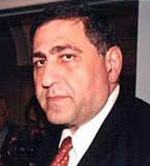“We recognize Armenia as an independent country. We don’t have diplomatic relations, but we do respect the independence of Armenia as well as that of the other post-Soviet countries,” said adviser to the Turkish Prime Minister Egemen Bagish a couple of days ago in New York.
According to Bagish, Turkey is not opening the border with Armenia simply because Armenia refuses to recognize those borders. He adds that the Constitution of Armenia states not to recognize Turkey’s borders. The opening of the Armenian-Turkish border was also discussed during the meeting of Turkish and Azerbaijani presidents in Baku a couple of days ago. Opening the border has to do with recognition of the Armenian Genocide and the Karabagh conflict. The Turkish and Azerbaijani presidents have also reflected upon the latter issue during their meeting. President of Turkey once again announced that the Karabagh conflict would be resolved in accordance to Azerbaijan’s territorial integrity principle. As for the first issue, a conference took place in the Czech Republic just a couple of days ago. The issue concerning the recognition of the Armenian Genocide was discussed at the Senate building of the Czech parliament under the patronage of former president of the Czech Republic Vatslav Haveli. The initiative was taken by member of the Senate Yaromir Shtetina and the “Armenian Club” NGO. Among the participants were former prime minister of Slovakia and former minister of Justice Yan Charnogurski, director of the Armenian Assembly of Europe Hilda Chobanyan, well-known historian from the U.S. Vahagn Dadryan, German scientist and Doctor Tessa Hoffman, deputy foreign minister of Armenia Arman Kirakosyan and others. Historian Dadryan made a speech in which he analyzed the documents on the Armenian Genocide kept in Turkey’s archives. Elda Uzchan presented Turkey’s point of views at the conference. Uzchan is currently under persecution for researching and publicizing evidence of human rights violations in Turkey and has taken refuge in Germany. During the conference, Senator Shtetia recalled that the Slovakian parliament has already passed a bill on the recognition of the Armenian Genocide and announced that Czech legislators are also preparing a bill, which will be presented to the Czech parliament. However, the Czech senator didn’t go further in detail and describe just what will be included in the bill to be presented to the parliament. In any case, almost all the speakers emphasized the fact that whoever forgets the past is condemned to repeat it. As for Turk lawyer Eldag Uzchan, who was present at the conference, he said that Europe must demand that Turkey recognize the Armenian Genocide committed by the Ottoman Turks. According to “Azatutyun” radio station, deputy foreign minister of Armenia A. Kirakosyan said that the official Yerevan has not changed its orientation and that Armenia is ready to negotiate with Turkey at any given time without setting any prerequisites. According to Kirakosyan, Armenia will always continue leading the politics on international recognition of the Armenian Genocide. He adds that recognition of the Armenian Genocide is crucial for Armenia’s national security.
“If Turkey recognizes the genocide, then that will serve as a guarantee for our nation that we are no longer in danger, that Turkey has taken the blame and is asking Armenia to forgive them for something that the Ottoman Turks had done in the past century,” says Arman Kirakosyan. He emphasized that Armenians “are not against the Turkish people” and recognition of the Armenian Genocide is not a counterattack to Turkey. It is worth mentioning that during an interview given to the British “Guardian” newspaper, well-known Turkish writer Orhan Pamuk had stated that in 2005, the Turkish government had “passed” a law, according to which any comments contradicting Turkey’s official orientation on the massacres of Armenians and Kurds in the past century are considered as offensive remarks about the Turkish people. Last year, the Turkish writer told a Swedish newspaper reporter during an interview that one million Armenians and 30 thousand Kurds had been massacred in Turkey during the past century and that nobody wants to talk about that. After making this announcement, Pamuk was arrested by Turkish police and was accused of offending the Turks. He saved himself from going to prison after he told the Turkish authorities about the many criticisms of Europeans on this issue.

